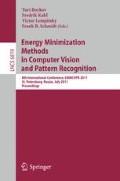Abstract
Subgradient descent methods for minimization of dual linear relaxed labeling problem are analysed. They are guaranteed to converge to the quality of the optimal relaxed labeling, but do not obtain an optimal relaxed labeling itself. Moreover, no stop condition is known for these methods upto now. The stop condition is defined and experimentally compared with the commonly-used stop conditions. The stop condition is defined in a way that when fulfilled a relaxed labeling is simultaneously obtained with arbitrary non-zero difference from the optimal labeling.
Access this chapter
Tax calculation will be finalised at checkout
Purchases are for personal use only
Preview
Unable to display preview. Download preview PDF.
References
Kolmogorov, V.: Convergent Tree-reweighted Message Passing for Energy Minimization. IEEE Transactions on Pattern Analysis and Machine Intelligence (PAMI), 28(10), 1568–1583 (2006)
Schlesinger, M.I., Antoniuk, K.V.: Diffusion algorithms and structural recognition optimization problems Cybernetics and Systems Analysis, vol. 48(2), pp. 3–12 (2011) (in Russian); English translation of the paper will be published at Cybernetics and Systems Analysis, vol. (2). Springer, Heidelberg (2011)
Schlesinger, M.I., Giginjak, V.V.: Solving (max,+) problems of structural pattern recognition using equivalent transformations. In: Upravlyayushchie Sistemy i Mashiny (Control Systems and Machines), Kiev, Naukova Dumka, vol. (1 and 2) (2007) (in Russian); English version: http://www.irtc.org.ua/image/publications/SchlGig_1_ru (Part 1), http://www.irtc.org.ua/image/publications/SchlGig_2_ru (Part 2)
Schlesinger, M.I., Antoniuk, K.V., Vodolazskii, E.V.: Optimal labeling problems, their relaxation and equivalent transformations
Shor, N.: Nondifferentiable optimization and polynomial problems, p. 394. Kluwer Academic Publisher, Dordrecht (1998)
Wainwright, M.J., Jaakkola, T.S., Willsky, A.S.: MAP estimation via agreement on (hyper)trees: Message-passing and linear-programming approaches. IEEE Transactions on Information Theory 51(11), 3697–3717 (2005)
Author information
Authors and Affiliations
Editor information
Editors and Affiliations
Rights and permissions
Copyright information
© 2011 Springer-Verlag Berlin Heidelberg
About this paper
Cite this paper
Schlesinger, M., Vodolazskiy, E., Lopatka, N. (2011). Stop Condition for Subgradient Minimization in Dual Relaxed (max,+) Problem. In: Boykov, Y., Kahl, F., Lempitsky, V., Schmidt, F.R. (eds) Energy Minimization Methods in Computer Vision and Pattern Recognition. EMMCVPR 2011. Lecture Notes in Computer Science, vol 6819. Springer, Berlin, Heidelberg. https://doi.org/10.1007/978-3-642-23094-3_9
Download citation
DOI: https://doi.org/10.1007/978-3-642-23094-3_9
Publisher Name: Springer, Berlin, Heidelberg
Print ISBN: 978-3-642-23093-6
Online ISBN: 978-3-642-23094-3
eBook Packages: Computer ScienceComputer Science (R0)

